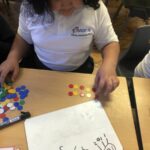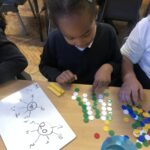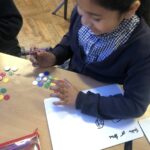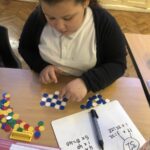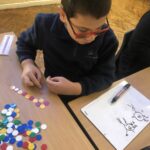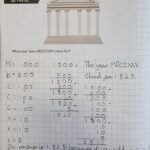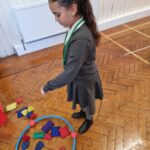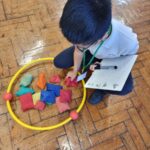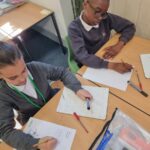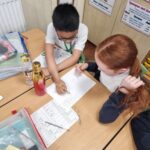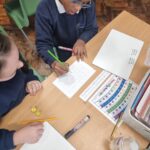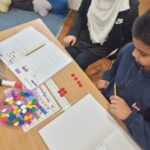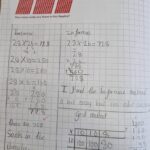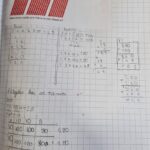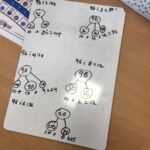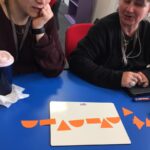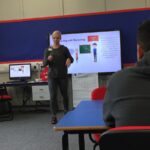Stratford Manor’s maths curriculum is underpinned by the teaching for mastery approach, and enables the children to develop confidence and enthusiasm, and encourages creativity and inquisitiveness. It develops a deep and interconnected understanding of mathematical concepts and uses practical equipment and pictorial representations to support the development from concrete to abstract understanding. The expectation is for the precise use of mathematical language and a focus on fluency, reasoning and problem solving in a wide variety of contexts.
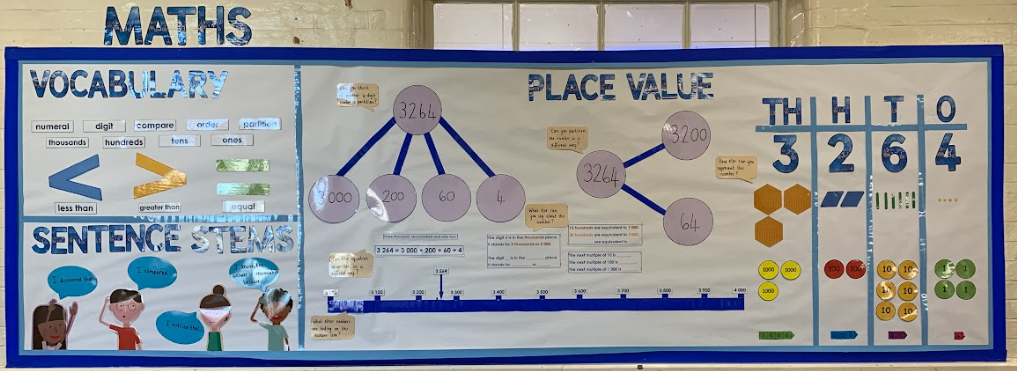
At Stratford Manor Primary School we consider mathematics as far more than simply a core curriculum topic; it is central to helping children become happy, articulate, reflective and confident individuals.
Developing numerical fluency prepares children to access a world surrounded by number and problem solving. It equips young people with key skills, which will be used extensively throughout their lives.
At Stratford Manor we follow a teaching for mastery approach to mathematics, which aims to develop a deep, long-term, secure and adaptable understanding of Maths through an inclusive approach where all children achieve. We spend significant time on each topic to deepen understanding and allow children to master concepts, before moving on. These topics are then revisited in the following years through our spiral approach which enables children to consolidate and build upon prior learning.
Our maths curriculum is underpinned by the teaching for mastery approach following the Maths – No Problem scheme, an evidence-based approach first developed in Singapore and fully aligned to the National Curriculum. The scheme is designed to give every pupil the opportunity for a deep conceptual understanding of maths.
In daily maths lessons all children have opportunities to build deep competency by exploring and explaining mathematical concepts, using manipulatives, pictures, words and numbers. We follow the C-P-A approach (Concrete, Pictorial, Abstract), which supports children to move from concrete representations (objects/cubes/counters etc.); to pictorial representations (drawings, bar models, diagrams etc.); before moving to an abstract representation such as a written calculation. Collaborative learning, talking and questioning also play a vital role in every Maths lesson. The children have the opportunity to explore, explain, record and apply their mathematical learning and thinking. Age-appropriate mathematical vocabulary is mapped out across each year group and explicitly taught in lessons.
The Maths learning journey is organised into chapters. Each chapter focuses on one aspect of the maths curriculum and contains a series of progressive lessons that develop skills and understanding through the solving of problems in real-life contexts. At the end of the chapter the children complete a review. This provides them with the opportunity to apply what they’ve learnt and enables the teachers to assess the children’s understanding and their ability to apply their learning independently.
Lesson Approach
Each Maths lesson includes these core elements: exploration, structured discussion, guided practice and independent practice.
Exploration: The children are presented with a real-life problem to explore. Children collaboratively explore the task themselves, however they see fit, whether this is with concrete resources, modelling or different strategies etc. This gives pupils the opportunity to interact with and learn from one another. They are encouraged to use manipulatives and visual representations to solve the problem and explain their methods and thinking to each other. Children are not corrected or told if their solution works, but instead are questioned to enable them to see for themselves whether they are successful. During this part of the lesson the teacher is observing and assessing the children’s understanding.
Structured discussion: Pairs/groups feedback their strategy and solution to the class and there is a structured discussion to enable the children to deepen their understanding. The teacher will use targeted questioning to draw out different methods to discuss and any misconceptions to rectify. They can also read through worked examples in the MNP textbooks to further scaffold their understanding.
Guided practice: The children are provided with further problems for guided practice, variations on the initial problem, that they solve collaboratively using the methods derived from the initial problem. Children are again expected to explain their methodology and not just provide solutions. This part of the lesson provides teachers with the opportunity to identify and address any misconceptions and provide scaffolding or additional challenge as appropriate.
Independent practice: Children individually solve further problems that provide the opportunity to apply what they have learnt in the lesson. The teacher will have identified who may need additional scaffolds such as concrete manipulatives and encourage children to use them. Staff circulate during independent practice to ensure any misconceptions can be addressed before children move on to the next lesson and offer further challenge to those who require it.
In line with our mastery approach, each child has a Maths Journal and a Maths Workbook.
The journal is a record of their learning journey showing the development of their mathematical knowledge, skills and understanding and whenever possible should demonstrate their thought process. Journaling doesn’t take place in every lesson; we provide purposeful and well planned journaling opportunities to help children to reflect, refine and question their mathematical thinking in every chapter. It also gives learners an opportunity to develop their communication skills by learning to articulate their ideas and explicate their mathematical thinking using appropriate mathematical vocabulary.
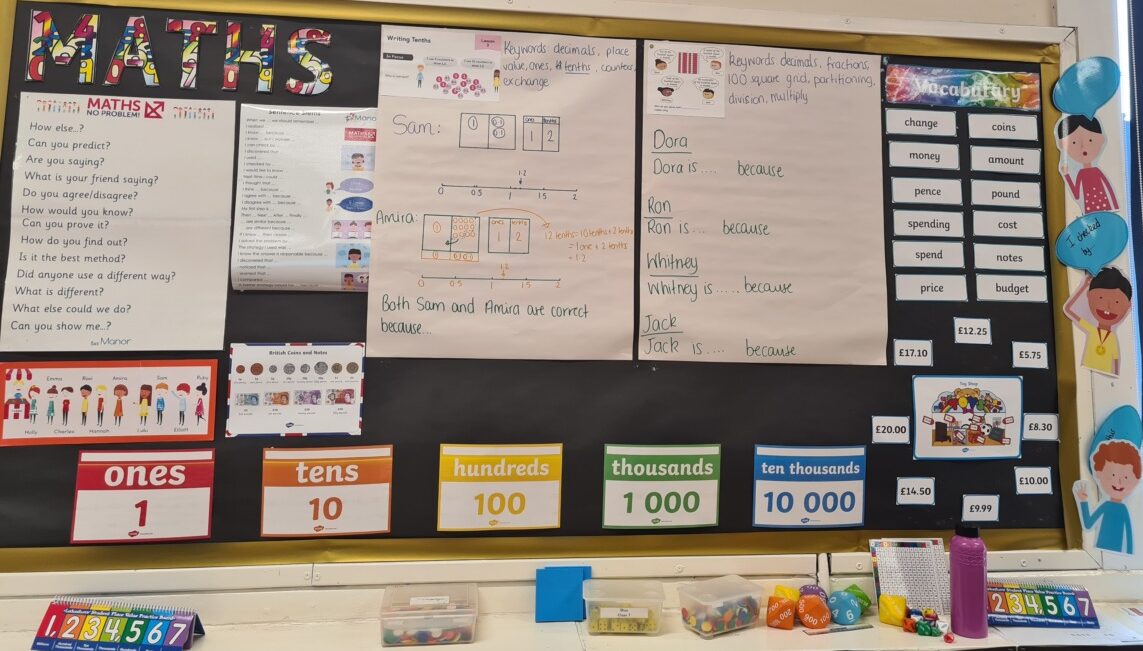 For more information about our approach to Mathematical Journaling, click here.
For more information about our approach to Mathematical Journaling, click here.
The Workbook is where they complete their independent practice and this takes place in every lesson.
At Stratford Manor we believe that our teaching of mathematics:
- promotes enjoyment of learning through practical activity, exploration and discussion;
- develops confidence and competence with numbers and the number system;
- develops the ability to solve problems through decision-making and reasoning in a range of contexts;
- helps children understand the importance of mathematics in everyday life.
All children are given opportunities to:
- develop a sense of the size of a number and where it fits into the number system (place value);
- become fluent in number facts such as number bonds, multiplication tables, doubles and halves;
- solve simple problems mentally, using jottings personal to them and the bar model to visualise the problem;
- use mathematical vocabulary to support their explanations;
- calculate accurately and efficiently, both mentally and with pencil and paper, drawing on a range of calculation strategies and judging whether their answers are reasonable;
- explore the features of shape and space, and develop measuring skills in a range of contexts;
- explain and make predictions using graphs, diagrams, charts and tables.
Arithmetic
In order to further develop the children’s sense of number we have additional Arithmetic sessions, where the children have the opportunity to develop confidence and fluency with numbers and the four operations, improving their recall of number facts (including multiplication and division facts up to 12 x12) and their concept of place value.
Reception, Year 1 and 2 follow the NCETM Mastering Number Programme which is designed to develop solid number sense, including fluency and flexibility with number facts, which will have a lasting impact on future learning for all children. The aim over time is that children will leave KS1 with fluency in calculation and a confidence and flexibility with number. These sessions take place 4 times a week.
KS2 have a dedicated arithmetic session once a week. Fluency is also a focus of the daily maths lesson.
We offer all of our children opportunities to use interactive maths applications – Mathletics and Times Tables Rockstars – to support them gaining fluency.
Children are also encouraged to practise these skills at home by using the above apps and other activities.
Please click below to view the Maths Curriculum Overview for each year group.
——–
Yearly Overviews for Mathematics
We teach Maths using the Maths No Problem scheme, an approach to teaching maths developed in Singapore. Problem solving, fluency and relational understanding are at the heart of the scheme. It uses the Concrete Pictorial Abstract (CPA) approach and allows pupils to spend enough time to fully explore a topic, reinforcing it with practice, before moving onto the next one. All ideas are built on previous knowledge and pupils have ample opportunity to develop relationships between topics.
Lessons typically are broken into four parts:
- Anchor Task/ Explore task – the entire class spends time on a question guided by the teacher. The children are encouraged during this time to think of as many ways as possible to solve the question as possible.
- New Learning – the teacher introduces and explains the new learning for the lesson.
- Guided Practice – children practice new learning in groups, pairs or individually guided by the teacher.
- Independent Practice – practice on your own. Once children have mastered the concept they use their reasoning and problem-solving skills to develop their depth of learning.
Key points:
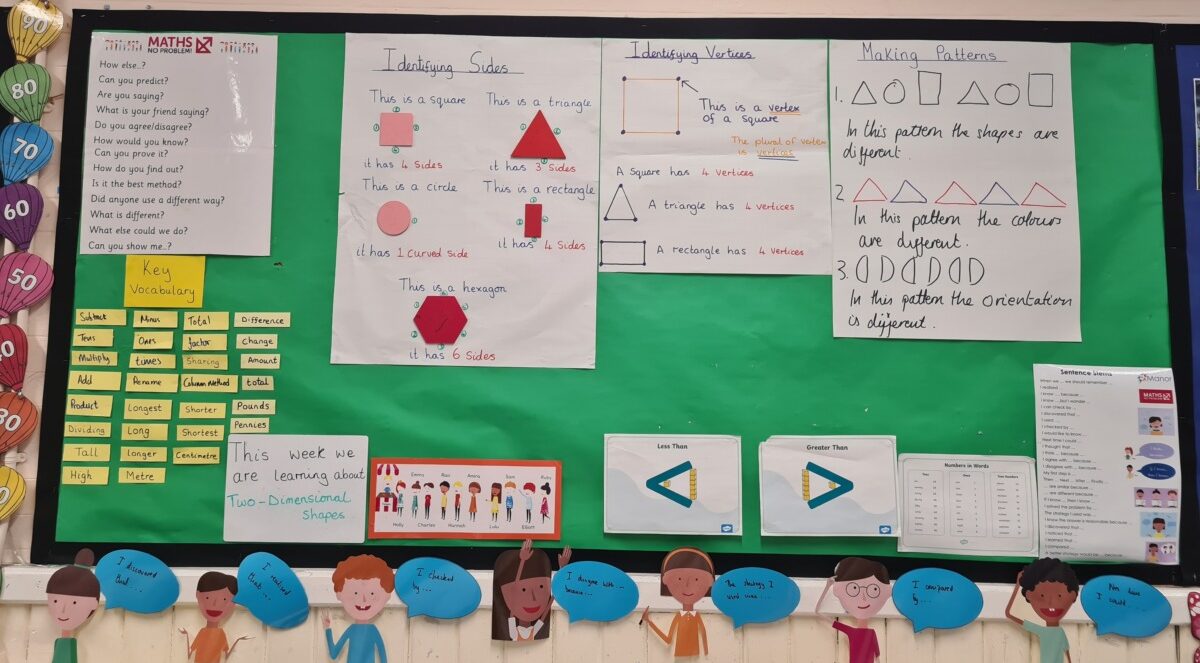
- A highly effective approach to teaching maths based on research and evidence
- Builds students’ mathematical fluency without the need for rote learning
- Introduces new concepts using the Concrete Pictorial Abstract (CPA) approach
- Pupils learn to think mathematically as opposed to reciting formulas they don’t understand
- Teaches mental strategies to solve problems such as drawing a bar model
We also use J2E Blast, Mathletics and Timestables Rockstars as a tool to help pupils develop number fluency.


